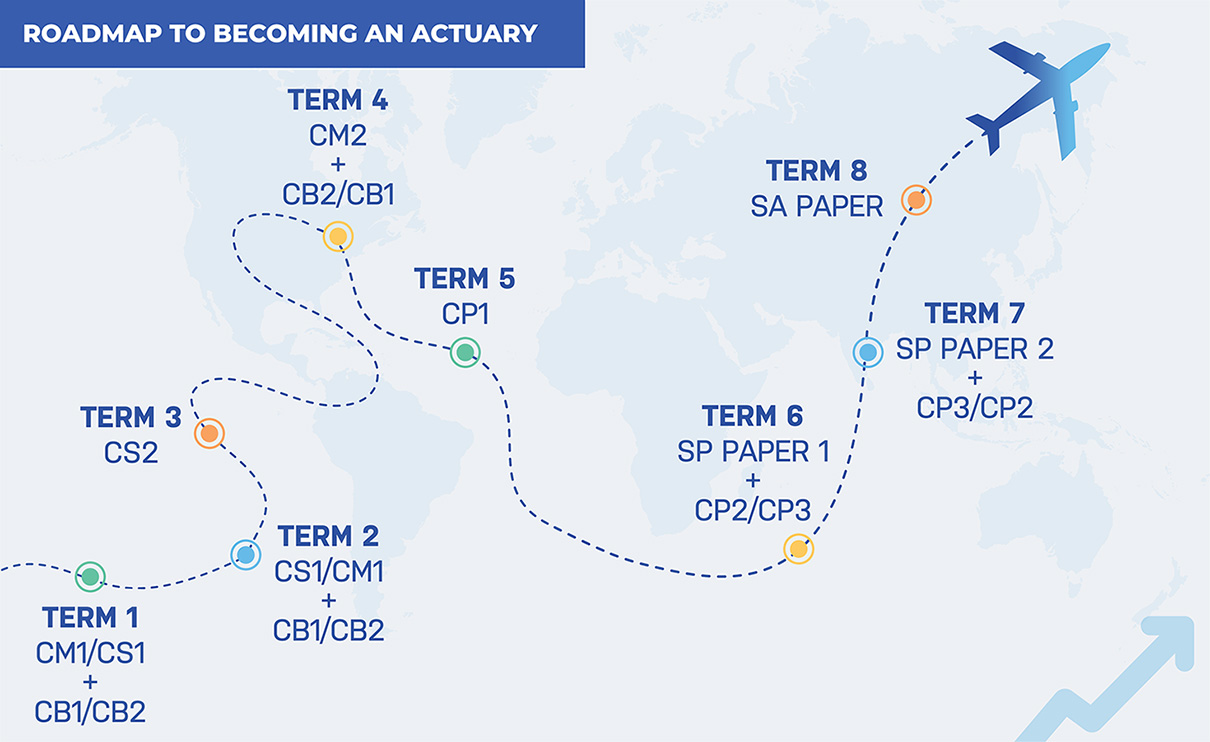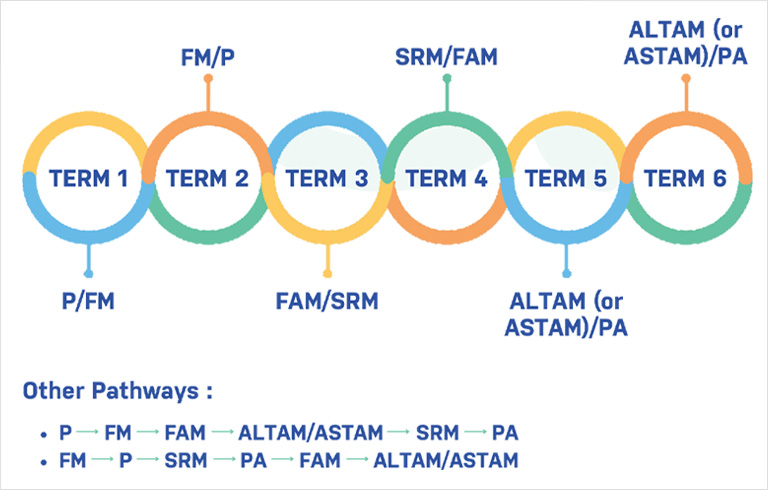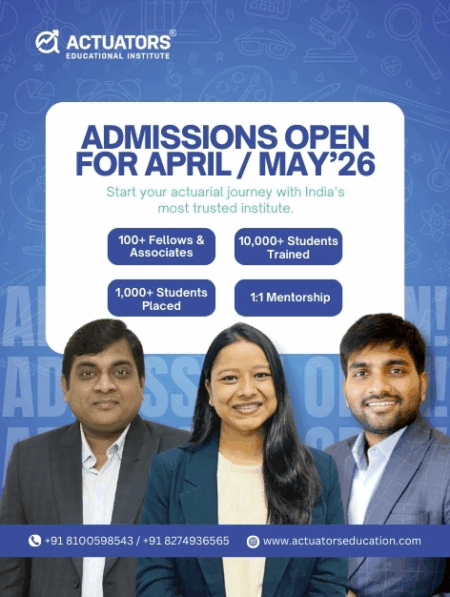What does an actuary do?
Actuaries are professionals skilled in evaluating the financial consequences of uncertain future events. They utilize data science and analytics to create financial models that predict risks and uncertainties based on past trends and future forecasts. Their expertise also extends to reserving, data science, investment valuations, pricing, risk management, pensions.
Salary Structure
| Papers Cleared |
Experience |
Salary |
| 3-6 |
0-1 Year |
6-10 LPA |
| 6-10 |
1-2 Years |
10-15 LPA |
| 10 |
2-3 Years |
15-20 LPA |
| 11-12 |
3-4 Years |
20-25 LPA |
| Fellow |
4-6 Years |
25-35 LPA |
Disclaimer: The salary structure provided here is approximate and based on our past experience.
Who can become an Actuary?
By virtue of the role of an Actuary as a multi-skilled professional in core areas of financial risk and uncertainty, a candidate with strong skills in Mathematics, Statistics, Data Analytics and Finance with good analytical skills, logical reasoning coupled with a willingness to put work hard continuously to learn and pass all actuarial examination subjects, can be an ideal candidate.
Eligibility Criteria
Associate Papers
CORE PRINCIPLES PAPERS (ALL)
-
CM1
Actuarial Mathematics
-
CM2
Economic Modelling
-
CS1
Actuarial Statistics
-
CS2
Risk Modelling & Survival Analysis
-
CB1
Business Finance
-
CB2
Business Economics
-
CB3
Business Management
Core Practice Papers (All)
-
CP1
Actuarial Practice
-
CP2
Modelling Practice
-
CP3
Communication Practice
Fellow Papers
Specialist Principles Papers (Any 2)
SP0
Master's Level ThesisSP1
Health and Care SP2
Life InsuranceSP4
PensionsSP5
Investment & FinanceSP6
Financial DerivativesSP7
General Insurance: ReservingSP8
General Insurance: PricingSP9
Enterprise Risk Management
Specialist Advanced Papers (Any 1)
SA0
Research Master's Level ThesisSA1
Health and Care SA2
Life InsuranceSA3
General InsuranceSA4
PensionsSA7
Investment & Finance

Society of Actuaries
Society of Actuaries (SOA) is the world’s largest Actuarial professional organization, with more than 34,000 members worldwide.
 Comprehensive Education and Rigorous Standards.
Comprehensive Education and Rigorous Standards.
 Global Recognition and Opportunities.
Global Recognition and Opportunities.
 Diverse Practice Areas.
Diverse Practice Areas.
 Commitment to Research & Professional Development.
Commitment to Research & Professional Development.
 Strong Professional Network.
Strong Professional Network.
SOA e-learning modules
 Pre-Actuarial Foundations Module
Pre-Actuarial Foundations Module
 Advanced Topics in Predictive Analytics(ATPA) Assessment
Advanced Topics in Predictive Analytics(ATPA) Assessment
 Fundamentals of Actuarial Practice (FAP) E-learning Course
Fundamentals of Actuarial Practice (FAP) E-learning Course
 Actuarial Science Foundations Module
Actuarial Science Foundations Module
ASA Pathway

SOA ASSOCIATE PAPERS
P
ProbabilityFM
Financial MathematicsFAM
Fundamentals of Actuarial MathematicsSRM
Statistics for Risk ModellingPA
Predictive AnalyticsALTAM
Advanced Long/Short Term Actuarial Mathematics
VEE (Validation by Educational Experience)
In addition to the exams you will also have to clear 3 VEEs
 VEE Mathematical Statistics
VEE Mathematical Statistics
 VEE Accounting and Finance
VEE Accounting and Finance
 VEE Economics (Micro and Macro)
VEE Economics (Micro and Macro)
 It takes 30 hours or less to complete each VEE.
It takes 30 hours or less to complete each VEE.
 You can get VEE exemption through your university course
You can get VEE exemption through your university course
Choosing between IAI | IFoA | SOA
| Basis |
IAI |
IFoA |
SOA |
| Established in |
India |
UK |
USA |
| Entrance Exam |
ACET |
No Exam |
No Exam |
| Exam Passing Percentage |
Volatile 20% to 65% |
30% to 50% |
30% to 50% |
| Exam Frequency |
All the exams are conducted twice a year. |
All the exams are conducted twice a year. |
Different for each paper. |
| Exam Format |
Exams for CM, CS and CB papers are 100% MCQ based. |
All the exams are subjective. |
P, FM, FAM & SRM are MCQ Based. |
 16 years of age recommended 10+2 cleared.
16 years of age recommended 10+2 cleared. Students who are in intermediate college are also eligible
Students who are in intermediate college are also eligible Students can register for CM1 or CS1 (Any 1) without an IFoA membership. To appear for subsequent exams you must obtain IFoA membership.
Students can register for CM1 or CS1 (Any 1) without an IFoA membership. To appear for subsequent exams you must obtain IFoA membership.
 Fully qualified members of the Institute of Chartered Accountants of India, Institute of Cost Accountants of India and Institute of Company Secretaries of India
Fully qualified members of the Institute of Chartered Accountants of India, Institute of Cost Accountants of India and Institute of Company Secretaries of India MBA in Finance (Minimum 60% or equivalent grade)
MBA in Finance (Minimum 60% or equivalent grade) IIM Graduate
IIM Graduate BSc/MSc in Actuarial Science from Institute/ Colleges
BSc/MSc in Actuarial Science from Institute/ Colleges B.E from Institute (Minimum 60% or equivalent grade)
B.E from Institute (Minimum 60% or equivalent grade) IIT Graduates
IIT Graduates Fellow Member of Insurance Institute of India
Fellow Member of Insurance Institute of India Passed two papers from any of the below actuarial bodies:
Passed two papers from any of the below actuarial bodies: Qualified 1st year Bsc.,Msc. Actuarial science from Amity University
Qualified 1st year Bsc.,Msc. Actuarial science from Amity University Graduation and Post-graduation diploma in Actuarial Science/ Statistics (PGDAS)
Graduation and Post-graduation diploma in Actuarial Science/ Statistics (PGDAS) Bcom in Actuarial Management Affiliated to Bharathiar University
Bcom in Actuarial Management Affiliated to Bharathiar University Bachelor/Masters of Statistics (Honours)/Mathematics (Honours) from Indian Statistical Institute
Bachelor/Masters of Statistics (Honours)/Mathematics (Honours) from Indian Statistical Institute Master of Science in Quantitative Economics [MS (QE)]/Quality Management Science [MS (QMS)] from Indian Statistical Institute
Master of Science in Quantitative Economics [MS (QE)]/Quality Management Science [MS (QMS)] from Indian Statistical Institute
 Recommended 10+2 cleared
Recommended 10+2 cleared




